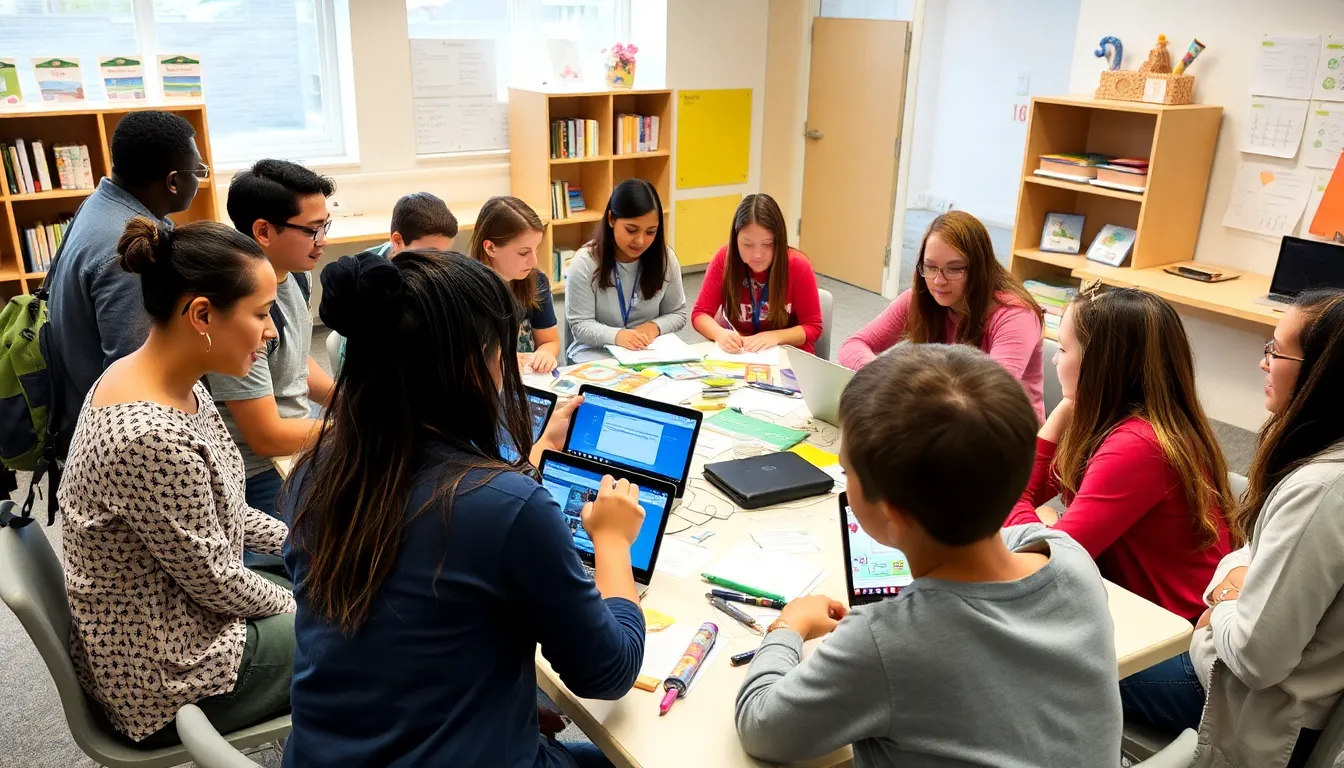Elementary education workshops are the secret sauce to transforming classrooms into vibrant learning hubs. Picture this: teachers armed with fresh strategies, innovative tools, and a sprinkle of inspiration, ready to tackle the challenges of young minds. These workshops don’t just fill time; they ignite passion and creativity, making learning as exciting as a surprise pizza party on a Friday.
In a world where teaching can sometimes feel like herding cats, these workshops offer a lifeline. They provide educators with practical skills and a supportive community, all while keeping the mood light and engaging. After all, who said professional development can’t come with a side of laughter? Dive into the world of elementary education workshops and discover how they can turn the ordinary into the extraordinary, ensuring that every child’s learning journey is both fun and effective.
Table of Contents
ToggleOverview of Elementary Education Workshops
Elementary education workshops play a vital role in enhancing classroom experiences. Teachers gain access to innovative strategies and practical tools designed specifically for young learners. Each session encourages collaboration among educators, creating a community of support and shared knowledge.
Participants in these workshops explore diverse teaching methods, from interactive learning to technology integration. Incorporating hands-on activities engages teachers and reflects the dynamic nature of today’s classrooms. Many workshops emphasize the importance of adapting techniques to meet the unique needs of students.
Workshops often focus on critical areas such as literacy, numeracy, and social-emotional learning. Educators discover new ways to foster a positive classroom environment, which enhances student engagement. With expert facilitators guiding discussions, teachers can address current challenges in education.
Additionally, these workshops provide a platform for teachers to share their experiences, fostering a culture of continuous improvement. Feedback from peers helps refine teaching practices, leading to more effective classrooms. Regular participation can transform instructional approaches, ensuring they remain relevant and impactful.
By engaging in these professional development opportunities, teachers enrich their skill sets and boost confidence. The ripple effect of improved teaching ultimately benefits students, turning educational experiences into memorable journeys. As educators implement what they learn, classrooms evolve, supporting learners in achieving their full potential.
Benefits of Participating in Workshops

Participating in elementary education workshops offers several advantages for educators. Engaging in these workshops leads to significant professional growth and directly impacts students’ learning experiences.
Professional Development for Educators
Professional development occurs through hands-on training in these workshops. Educators engage with expert facilitators who share current educational practices. Skill enhancement motivates teachers to continue their professional journeys. Networking opportunities arise among peers, fostering collaboration and support. Insights gained from various teaching strategies equip educators to face classroom challenges. Continuous improvement becomes a natural part of their teaching routine.
Enhanced Teaching Techniques
Innovative teaching techniques emerge from participation in workshops. Educators learn to integrate technology seamlessly into their lesson plans. Interactive learning methods and diverse instructional strategies promote active engagement. Techniques designed to address literacy and numeracy needs enrich classroom environments. Strategies focusing on social-emotional learning create a holistic approach. Enhanced teaching practices contribute to improved student outcomes and overall classroom dynamics.
Types of Workshops Available
Various workshops enhance educators’ skills and effectiveness in the classroom. Each workshop type offers unique opportunities for professional growth.
Curriculum-Focused Workshops
Curriculum-focused workshops target essential subjects, equipping teachers with effective strategies to enhance student engagement. These sessions often delve into literacy and numeracy techniques, engaging educators in hands-on activities that reinforce the curriculum’s core components. Furthermore, educators learn how to design lesson plans that align with current educational standards. Interactive discussions promote the exchange of successful classroom experiences, allowing teachers to adapt techniques for diverse learners. Ultimately, these workshops empower educators to create rich learning environments that cater to all student needs.
Technology Integration Workshops
Technology integration workshops emphasize the importance of incorporating digital tools in education. Participants explore various platforms and applications designed to enhance teaching and learning. Educators receive training on effective methods to implement technology in classrooms, fostering collaboration and creativity among students. In addition, these workshops feature case studies showcasing successful tech integration in real-world settings, providing practical insights. Engaging with peers during these sessions allows teachers to share innovative ideas and best practices. By embracing technology, educators can better prepare their students for a rapidly evolving digital landscape.
How to Choose the Right Workshop
Choosing the right elementary education workshop enhances teaching and benefits students. Consider these factors in making an informed decision.
Assessing Your Needs as an Educator
Evaluate specific teaching goals to identify gaps in knowledge or skills. Examine personal strengths and areas requiring improvement, such as literacy techniques or technology integration. Focus on student needs—including their engagement and learning styles—to align workshop content with classroom challenges. Prioritize workshops that cover areas impacting educational outcomes, ensuring the professional development experience translates directly into enhanced instruction. Seek opportunities that foster collaboration among peers, as this can lead to valuable insights and new teaching strategies.
Researching Workshop Providers
Investigate various workshop providers to determine their credibility and expertise. Review testimonials from previous participants to gauge satisfaction and effectiveness. Analyze the qualifications of facilitators, focusing on their experience in elementary education. Compare the curriculum of different workshops, ensuring it aligns with educational standards and best practices. Explore offerings that emphasize hands-on training and collaborative learning. Prioritize providers that provide follow-up support or resources after the workshop, facilitating continued growth and application of new strategies in the classroom.
Elementary education workshops serve as a vital resource for teachers seeking to enhance their skills and improve student engagement. By participating in these workshops, educators not only gain practical strategies but also become part of a vibrant community focused on collaboration and innovation.
The hands-on training and diverse teaching methods explored lead to meaningful changes in classroom dynamics. As teachers implement new techniques, they create enriched learning environments that cater to the unique needs of their students.
Ultimately, these workshops empower educators to transform their teaching practices, fostering an atmosphere where both teachers and students can thrive. Investing in professional development through workshops is a significant step toward achieving excellence in education.






